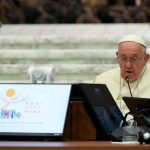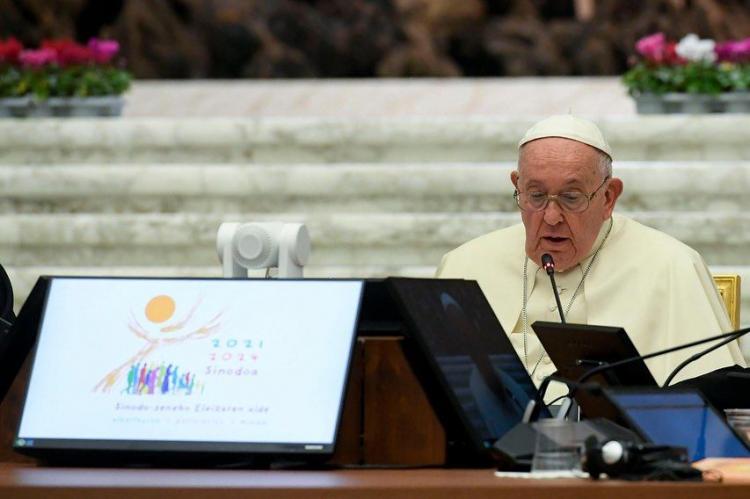

At the opening of the second session of the XVI General Assembly of the Synod, Francis highlighted the path taken since Vatican II and asked not to confront hierarchy and laity.
 Pope Francis at the opening of the second session of the Synod of Synodality (VaticanMedia)
Pope Francis at the opening of the second session of the Synod of Synodality (VaticanMedia)

He Pope Francis today presided over the opening of the second session of the XVI General Assembly of the Synodin the Vatican, defending a new relationship between the hierarchy and the laity, particularly in the exercise of the ministry of bishops.
The Synod of Bishops is “a plural and symphonic entity capable of supporting the path and mission of the Catholic Church, effectively helping the bishop of Rome in his service to the communion of all the Churches and of the entire Church,” Francis recalled. , following Paul VI, and urged to consider the synodal assembly “as a process and not simply as an event.”
“The composition of this XVI Assembly is more than a contingent fact. It expresses a way of exercising the episcopal ministry consistent with the living Tradition of the Church and with the teaching of the Second Vatican Council: the bishop, like any other Christian, can never think in himself without the other,” defended the pontiff in the Paul VI Hall.
The synodal session has 368 voting members, of which 272 are bishops; As happened in 2023, more than 50 voters are women, including religious and lay people from various countries.
In a space arranged with several circular tables, placed at the same level, as happened in 2023, Francis highlighted that the presence, as “full members”, of a significant number of lay and consecrated people (men and women), deacons and priests , is a decision taken “in coherence with the understanding of the exercise of the episcopal ministry” expressed by the Second Vatican Ecumenical Council (1961-1965).
“The bishop, principle and visible foundation of the unity of the particular Church, cannot live his service except among the people of God,” he stated.
No to the confrontation between hierarchy and laity
The intervention rejected the idea that the Synod would pit the hierarchy against the laity.
“It is certainly not about replacing one with another, encouraged by the cry: now it’s our turn. This is not right,” he observed.
The Pope stressed the need to reflect on the forms that the exercise of episcopal authority is called to take “in a Church conscious of being constitutively relational and, therefore, synodal.”
The fact that we are gathered here – Bishop of Rome, bishops representing the world episcopate, lay men and women, consecrated men, deacons and priests who are witnesses of the synodal path, together with the fraternal delegates – is a sign of the Church’s will to listen to the voice of the Holy Spirit”.
The new session will last until October 27, with the theme ‘For a synodal Church: participation, communion, mission’; The first session took place in October 2023, following a global consultation launched by the Pope two years earlier.
Learning process
“The XVI Ordinary Assembly of the Synod of Bishops, now in its second session, is representing in an original way this ‘walking together’ of the people of God,” Francis said.
The Pope spoke of a “learning process,” in which “the Church learns to know itself better and to identify the forms of pastoral action most appropriate to the mission entrusted to it.”
The speech expressed the hope that “a truly synodal Church in mission will be created, one that knows how to go beyond itself and inhabit the geographical and existential peripheries.”
During the penitential vigil we had this experience. We ask for forgiveness, we recognize that we are sinners. We put aside our pride, we put aside the presumption of feeling better than others. Have we become more humble?”
It is the supportive and compassionate humility of someone who feels like everyone’s brother, suffering the same pain and recognizing in the wounds and wounds of each one the wounds and wounds of Our Lord.”
Under the guidance of the Holy Spirit
The intervention evoked, on several occasions, the importance of the Holy Spirit, as a “guide” for the work of the coming weeks.
“The Holy Spirit always accompanies us,” Francis reiterated once again: “It is consolation in sadness and tears, especially when – precisely because of the love we have for humanity – in the face of things that are not going well, injustices that prevail, the obstinacy with which we resist responding with good to evil, the difficulty in forgiving, the lack of courage to seek peace, discouragement overcomes us, it seems to us that there is nothing left to do and we let ourselves fall. in despair. The Holy Spirit dries the tears and comforts because it communicates the hope of God. God does not tire, because his love does not tire.
“The Holy Spirit penetrates that part of us that is often very similar to the courts, where we judge the accused and formulate our sentences, most of the time condemnatory”, the other example chosen by the Pope: “God welcomes “Everyone, always, and offers everyone new possibilities of life, until the last moment. That is why we must always forgive everyone, aware that the will to forgive is born from the experience of having been forgiven.”
Church Service
The Synod of Bishops, established in 1965 by Saint Paul VI following the Second Vatican Council, can be defined, broadly, as an assembly of representatives of Catholic episcopates from around the world, joined by experts and other guests. , with the task of helping the Pope in the government of the Church.
“In the sixty years since then, we have learned to recognize in the Synod of Bishops a plural and symphonic theme, capable of supporting the path and mission of the Catholic Church, effectively helping the Bishop of Rome in his service to the Church , communion of all the Churches and of the entire Church,” said Francis.+